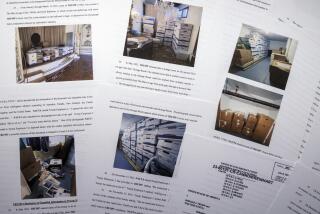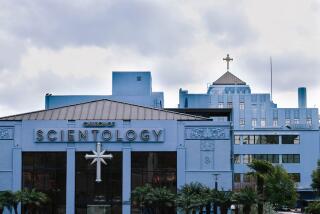Judge Assailed by Sanctuary Trial Defense
- Share via
TUCSON — The trial of 11 church workers, facing charges in connection with their work in the nation’s sanctuary movement, took a bitter turn Friday with defense lawyers accusing the judge of bias and the prosecutor accusing them of “inflammatory and prejudicial statements” to the jury.
The federal district judge, for his part, accused the defense of straying beyond earlier court rulings that limited a religious-based defense of the movement’s activities.
The proceeding became acrimonious as defense lawyer Robert Hirsh continued his closing arguments on behalf of Presbyterian minister John M. Fife, a co-founder of the movement to help Central Americans resettle in the United States illegally.
Called Humanitarians
Hirsh again stressed what he called the innocent acts of humanitarians, which the government alleges constituted a criminal conspiracy. “What are the motives here?” Hirsh asked at one point. “These (Central Americans) are people who aren’t criminals. These are people who are fleeing their homeland. Flesh and blood human beings.
“Who’s going to help them if the church doesn’t help them? There’s no motive for anybody to go out and recruit illegal aliens and bring them into the U.S. You have nothing more than a patchwork of churches doing what churches ought to do. What do you expect them to say, ‘Get out of here!’? Would anybody in this country, would the (Immigration Service) ever expect the churches to do that?”
During the 5 1/2-month trial, two undercover informers testified that they infiltrated the sanctuary movement by using cover stories of sympathy and wanting to help. In dismissing the government’s allegations that a criminal conspiracy existed, Hirsh told the jury: “Look at the cover stories here of morally good acts they have to tell” to join “this so-called conspiracy.”
“(The government) set out to get these people, people whose responsibility is to provide care for refugees, alcoholics, homeless, the downtrodden.”
‘They Want This Case’
He implied that the investigation into the sanctuary movement was prompted by the movement’s criticism of the Immigration and Naturalization Service. “They want this case bad,” Hirsh told the jury, “not because there’s a bad person here but because they want it.”
Federal District Judge Earl H. Carroll criticized Hirsh for his comments Thursday that characterized help given to Central Americans as equal to urging Jews living under Hitler to claim to be Catholic to avoid persecution: “I perceive a spirited effort by Mr. Hirsh to get before the jury a . . . defense of duress or necessity.”
Carroll had earlier held that the church workers could not offer a lesser-of-two-evils defense, an argument that the compelling plight of the aliens in their Central American homelands excused those who provided succor to them.
Criticism of Judge
After citing other acts by the judge, another defense attorney, William G. Walker, told Carroll that limits placed on Hirsh’s closing arguments show “where your sympathies are in this case.”
“Vastly unfair,” said defense attorney Michael Piccareta.
“I am mindful,” Carroll replied, “of the defense’s repeated statements regarding their perception of my bias.”
Prosecutor Donald M. Reno objected also to Hirsh’s making “highly inflammatory, prejudicial comments outside the (evidentiary) record” to the jury.
At one point, Carroll recessed the trial and left the courtroom as defense lawyers continued to object.
The defense is scheduled to resume its closing arguments Tuesday, with the case going to the jury perhaps the next week.
More to Read
Sign up for Essential California
The most important California stories and recommendations in your inbox every morning.
You may occasionally receive promotional content from the Los Angeles Times.













